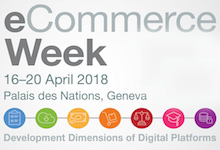Closing of the e-commerce week 2018
20 Apr 2018 17:00h - 18:00h
Event report
[Read more session reports from the UNCTAD E-Commerce Week 2018]
The Secretariat provided a brief overview of the week and informed the session about the outcomes of the event. Ms Shamika Sirimanne (Director, Division on Technology and Logistics, United Nations Conference on Trade and Development (UNCTAD)) opened the session by explaining that a summary report of the week would be made available soon. Mr Torbjörn Fredriksson (Chief, ICT Policy Section, Division on Technology and Logistics, UNCTAD) presented some statistics on participation during the week: there were more than 1180 registered participants, attending over 60 sessions. Compared to last year, the number of sessions had doubled. Overall, there were 264 speakers, of which 41% were women. During the week, 113 countries were represented, developing countries adding up to 76% of the total. More than a hundred countries participated in the Intergovernmental Expert Group. Progress was also noted with regard to the E-trade for All network: its membership had grown from 15 to 29 in one year and the online platform had generated significant traffic, primarily from users in developing countries. The publication First year in Review 2017-2018 summarises the achievements of all partners. On the UNCTAD side, a number of reports were launched during the eCommerce Week.
Invited to take the floor next, an UNCTAD Youth representative talked about leveraging the potential of e-commerce as a force to: upgrade the education system and better adapt it to the digital skills needed, strengthen trust in youth, and strengthen the capacity of young people as entrepreneurs. ‘The youth of today are the ones that will inherit the world of tomorrow’, the representative stressed, calling for continued conversations at the national and global levels. Another call was made for the recognition of the right to fail, to make mistakes, under the increased pressure of decision-makers and social media. An opportunity to play an active role in the 2030 Agenda was also highlighted.
Sirimanne then asked for input from the delegates present in the room. The comments made commended UNCTAD for the organisation of the eWeek, the increased participation of women this year, as well as the vast expertise of the speakers. Suggestions for future improvements included: making available a live stream, recording the sessions, offering the possibility to share the experiences on the ground via an online platform, and encouraging more participation from least developed countries and from Asia and Africa. At the end, the entire UNCTAD team, the participants, and the speakers were thanked for their contribution to the success of the event.
By Roxana Radu
Related topics
Related event

